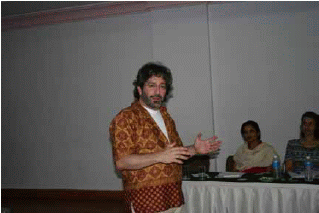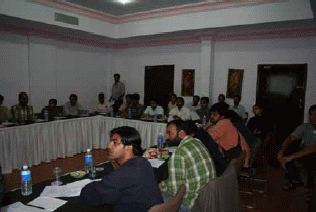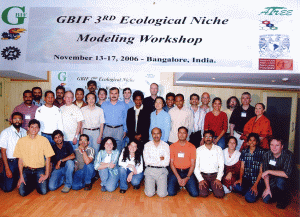Workshops
Workshop on Ecological Niche Modelling
Review of Key Papers & Desktop GARP Demo made it exciting!
The Eco-Informatics Centre’s just concluded workshop on Ecological Niche Modeling (ENM) gave practical advice on how to use ENM tools efficiently. The workshop was conducted by Prof Townsend Peterson, a leader in this field from the University of Kansas, USA and Dr Shaily Menon from Grant Valley State University, USA. The workshop held at Doddi’s Resort on 31 August, 2007 was attended by 35 researchers including those from ATREE, Centre for Ecological Science (CES), National Centre for Biological Science (NCBS), National Institute of Advanced Studies (NIAS) and Nature Conservation Foundation (NCF).

In the first half of the session, Prof Peterson gave a broad overview of ENM with interesting examples that ranged from predicting the distribution of Ebola virus in Africa to estimating species distribution of butterflies in Canada. Later, he explained, step by step, key factors that are important while conducting ENM studies. With reference to environmental data, he stressed the importance of data quality, type, source and methods of data collection. Regarding occurrence data, he explained how important it is to distinguish between primary and secondary sources. He cited GBIF, MaNIS, ORNIS, HerpNet, FishNet2 and MODIS satellite data as some useful reference sources for data. This was followed by a detailed evaluation of best model selection, modeling algorithms and validation. He also reviewed key papers in the field which gave a clear overview of how the entire field has evolved. Later, Dr Shaily Menon presented her work on ecological and geographic distribution of Asian nuthatches.

In the afternoon session, Prof Peterson demonstrated desktop GARP (Genetic Algorithm for Rule-set Production) and Maxent (Maximum Entropy Algorithm), the two modeling algorithms in ENM. He reviewed the strengths and weaknesses of the different modeling algorithms. This workshop was a refresher for those who are already doing research in ENM. For new comers, it gave a simplified understanding of concepts and technical know how.
GBIF 3rd Ecological Niche Modeling Workshop
13th to 17th November, 2006

For a country like India, which is among the twelve biologically most diverse countries of the world, web-based technology applied to biodiversity is indispensable for rational decision-making. Beyond the use of biological species as source of food and medicines, society is interested in the conservation of nature.
GBIF (Global Biodiversity Information Facility) has been putting unprecedented effort to make available worldwide the primary biodiversity data held in collections in the developed world. Recently GBIF crossed the landmark of the hundred million records of species presences that can be accessed through its web site (www.gbif.org ). To make full use of such databases, GBIF is training users from all over the world, but mainly from developing countries.
The 3rd GIBI workshop on Ecological Niche modeling was conducted in Bangalore , during November 13-17, 2006 in collaboration with the Ecoinformatics group at Ashoka Trust for Research in Ecology and the Environment (www.atree.org). 22 participants from various countries such as Africa, South East Asia, Europe, Asia, Australia and other parts of the world attended this workshop and share their experiences on this topic. 8 Faculties mostly from University of Kansas, American Museum of Natural History, CIMAT and ATREE were invited for delivering the lectures.
Starting from the concept of 'niche' and elaborating the concept of 'geographical niche' and 'ecological niche', later the participants were explicitly trained on using the tools for niche modeling and predicting distributions. Advanced software tools based on statistical algorithms were applied for prediction of the distributions of various plants and animal species, endemic species, invasive species, vectors of diseases, and species of conservation importance. Faculties also used online demonstration and presented the case-studies for selected topics. The aim of the workshop was to provide the tools, techniques and the knowledge on ecological niche modeling using various algorithms as well as demonstrating the ability of each of them.
The overall workshop was a good success as revealed from the participants' feedback as well as GBIF authorities.
For any further information, please refer to http://www.atree.org/gbif_enmw_2006.html
Conference and Workshop on Modeling Land-Use Land-Cover Change and Species
Distribution
January 11-13, 2005

The Eco-Informatics Centre recently organized a Conference and Workshop
on Modeling Land-Use Land-Cover Change and Species Distribution in Bangalore
from January 11-13, 2005.
This intensive workshop brought together individuals and agencies active
in ecological research, land-use planning, and conservation in India to
provide an exchange of ideas and training on the technical aspects of land-use
change and habitat modeling. The resource people included Prof. K. N. Ganeshaiah,
ATREE and University of Agricultural Sciences, Dr. J. Krishnaswamy, ATREE,
Dr. Shaily Menon, Grand Valley State University, Dr. Robert Gilmore Pontius
Jr, Clark University and Dr. M. Irfan Ullah, ATREE.
- Reasons for LUCC models
- Uses of LUCC models
- Mechanics of LUCC models
- Evaluation of LUCC models
- Reasons to compare maps
- Measures of Quantity and Location for pattern recognition
- Comparisons between two Categorical variables
- Comparisons between Real variables and Boolean variables
- Importance of Scale
- Consideration of Error
Concepts covered under species distribution modeling
- Ecological niche concept
- Biodiversity informatics
- Ecological niche modeling using genetic algorithms and ENFA (Ecological
Niche Factor Analysis)
- Errors (overprediction or commission, underprediction or omission)
- Habitat suitability maps
- Ecogeographical variables
- Marginality and Tolerance factors
- Applications of species distribution modeliny
Resource Persons
|




 ATREE, Tel: 91-80-23530069, 91-80-23533942
ATREE, Tel: 91-80-23530069, 91-80-23533942